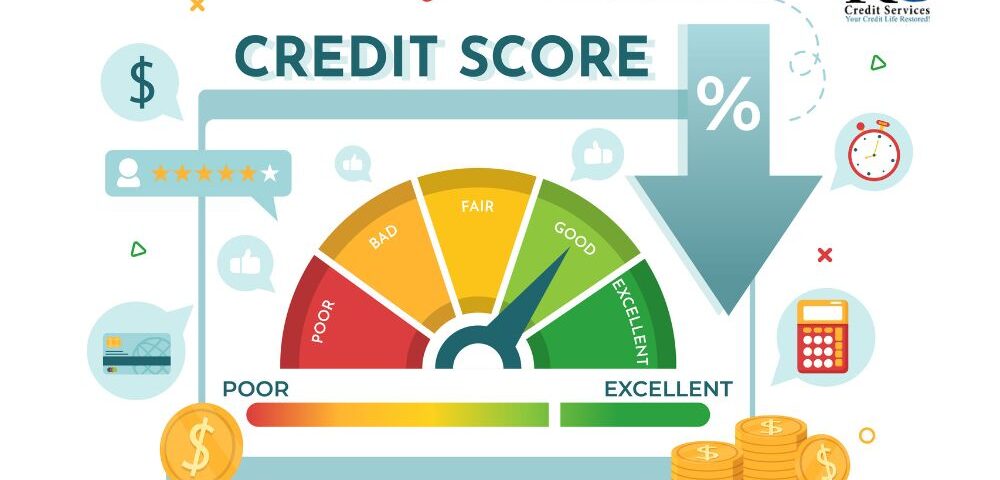- Credit Restoration Experts Nationwide

Is 850 the Magic Number? Exploring the Myth of the Perfect Credit Score
September 13, 2023
What is the E-OSCAR System for credit reporting?
October 4, 2023Small Changes, Big Results: Simple Habits That Can Drastically Improve Your Credit Score

A credit score is a numerical representation of your creditworthiness, indicating how likely you are to repay borrowed money and manage credit responsibly. Lenders, such as banks and credit card companies, use your credit score to assess the risk of lending you money. The higher your credit score, the lower the perceived risk, which can lead to better interest rates and more favorable loan terms.
Calculation of Credit Scores: The Important Components
Credit scores are typically calculated using complex algorithms that take into account various factors from your credit history. The most commonly used credit scoring models are FICO® Score and VantageScore. While the exact formula for calculating these scores is proprietary, the following components play a crucial role:
- Payment History (35%): This is the record of your past payments on credit accounts. Consistently making on-time payments positively impacts your score, while late payments, defaults, or bankruptcies can significantly lower it.
- Credit Utilization (30%): This refers to the ratio of your credit card balances to your credit limits. Keeping your credit utilization low (typically below 30%) demonstrates responsible credit usage and can positively affect your score.
- Length of Credit History (15%): The length of time you’ve had credit accounts influences your score. A longer credit history generally indicates a more stable financial behavior and can benefit your score.
- Types of Credit (10%): Having a mix of different types of credit, such as credit cards, installment loans, and mortgages, can demonstrate your ability to manage various forms of credit responsibly.
- New Credit (10%): Opening multiple new credit accounts in a short period can be seen as a sign of financial instability. Each new application also results in a hard inquiry, which can temporarily lower your score.
Credit Score Ranges and Significance
Credit scores typically range from 300 to 850, with higher scores indicating better creditworthiness. Here’s a general breakdown of credit score ranges and their significance:
- 300 – 579: Poor
- 580 – 669: Fair
- 670 – 739: Good
- 740 – 799: Very Good
- 800 – 850: Excellent
Having a good credit score is essential for several reasons:
- Access to Better Loan Terms: A good credit score can lead to lower interest rates on loans, such as mortgages, auto loans, and personal loans, saving you money over the long term.
- Credit Card Benefits: With a higher score, you’re more likely to qualify for credit cards with favorable rewards programs, cashback offers, and other perks.
- Rental Opportunities: Landlords often check credit scores when considering rental applications. A higher score can increase your chances of being approved for a rental property.
- Employment Opportunities: Some employers review credit reports as part of their hiring process, especially for positions that involve financial responsibilities.
- Insurance Premiums: Insurance companies may use credit scores to determine premiums for auto and home insurance. A better credit score could lead to lower insurance costs.
Understanding your credit score is the first step toward improving it. Regularly monitoring your credit report for errors and inaccuracies is crucial. Every year, you’re entitled to a free credit report from each of the three major credit bureaus (Equifax, Experian, and TransUnion). Reviewing these reports can help you identify any discrepancies that could be negatively impacting your score.
Small Habits, Powerful Impact: Practical Steps to Boost Your Credit Score
Building and maintaining a strong credit score is a journey that involves consistent, disciplined habits. These habits may seem small, but their impact on your creditworthiness can be profound. Here are some practical steps you can take to boost your credit score over time:
- Prioritize On-Time Payments: One of the most critical factors affecting your credit score is your payment history. Aim to make all your credit-related payments—whether they’re credit card bills, loan payments, or utility bills—on time. Even a single missed payment can have a negative impact on your credit score. To ensure prompt payments, consider setting up automatic bill payments or reminders through your bank or financial apps.
- Reduce Credit Card Balances: The utilization of your available credit—also known as credit utilization—plays a crucial role in your credit score. Aim to keep your credit card balances below 30% of your credit limit. High credit card balances relative to your limit can signal financial stress to lenders. Paying down credit card debt can have a rapid positive impact on your credit score.
- Monitor Your Credit Reports Regularly: Mistakes on your credit report can negatively affect your credit score. Obtain free copies of your credit reports from all three major credit bureaus—Equifax, Experian, and TransUnion—at least once a year and review them for inaccuracies. Dispute any errors you find to ensure that your credit report accurately reflects your financial history.
- Diversify Your Credit Mix: Lenders appreciate a mix of credit types on your report, such as credit cards, installment loans, and mortgages. Responsible management of various types of credit can demonstrate your ability to handle different financial responsibilities. However, avoid opening new credit accounts just for the sake of diversity, as excessive inquiries can temporarily lower your score.
- Avoid Opening Multiple New Accounts Simultaneously: Each time you apply for new credit, a hard inquiry is placed on your credit report. Multiple inquiries within a short time frame can signal to lenders that you might be seeking credit excessively, potentially impacting your credit score. Apply for new credit only when necessary and in a deliberate manner.
- Become an Authorized User: If you have a trusted friend or family member with a well-established credit account, consider becoming an authorized user on their account. This can potentially add positive payment history and increase the average age of your credit accounts, both of which can positively impact your credit score.
- Keep Old Accounts Open: The length of your credit history matters. Closing old credit accounts can shorten your credit history and potentially lower your credit score. Even if you don’t use a particular credit card anymore, keeping it open can contribute positively to the length of your credit history.
Improving your credit score is a gradual process. It’s not about making big changes overnight but rather about developing consistent financial habits that reflect responsible credit management. By adhering to these small yet impactful habits, you can pave the way for a stronger credit score and better financial opportunities in the future.
Developing Financial Discipline and Responsibility
Developing a healthy financial mindset is crucial for improving your credit score and overall financial well-being. It involves reshaping your attitudes and behaviors towards money, spending, and saving. By adopting a proactive and disciplined approach, you can take control of your finances and make significant strides toward a better credit score. Here’s how to make the necessary mindset shift:
- Prioritize Financial Awareness: Start by gaining a clear understanding of your current financial situation. Take an honest look at your income, expenses, debts, and savings. Track your spending patterns to identify areas where you can cut back and save more. This awareness is the foundation of responsible financial management.
- Embrace Delayed Gratification: One key aspect of financial discipline is learning to delay immediate wants for long-term goals. Instead of making impulse purchases, practice patience and save up for things you truly value. This not only helps you avoid unnecessary debt but also cultivates a sense of achievement as you work towards your goals.
- Set Realistic Budgets: Create a budget that outlines your monthly income and allocates specific amounts for essential expenses, savings, and debt payments. Stick to this budget consistently to prevent overspending and to ensure that you’re consistently chipping away at your debts.
- Distinguish Between Needs and Wants: Differentiating between essential needs and discretionary wants is pivotal. Prioritize spending on necessities like housing, utilities, and groceries before indulging in non-essential purchases. This practice prevents unnecessary spending and frees up funds for savings and debt repayment.
- Build an Emergency Fund: Life is unpredictable, and having an emergency fund can provide a safety net during unexpected financial challenges. Aim to save three to six months’ worth of living expenses in an easily accessible account. This buffer can help you avoid relying on credit cards or loans in times of crisis.
- Practice Responsible Credit Card Usage: Credit cards can be powerful tools when used responsibly. Pay off your credit card balances in full each month to avoid high-interest charges and accumulating debt. Limit your credit card usage to what you can comfortably pay off to prevent overextending yourself.
- Regularly Review and Adjust: Your financial situation and goals may evolve over time, so it’s important to regularly review your budget, spending habits, and financial goals. Adjust your strategies as needed to stay aligned with your objectives and maintain financial discipline.
- Celebrate Small Wins: Recognize and celebrate your progress along the way. Whether it’s paying off a credit card, reaching a savings milestone, or successfully sticking to a budget, acknowledging your achievements can reinforce positive financial habits.
- Seek Knowledge and Education: Continuously educate yourself about personal finance. Books, online resources, and financial experts can provide insights into better money management practices. The more informed you are, the more confident you’ll become in making sound financial decisions.
Developing financial discipline and responsibility is a gradual process. It’s about making conscious choices that align with your long-term goals and maintaining consistency over time. With the right mindset, you can pave the way for a healthier financial future and an improved credit score.

